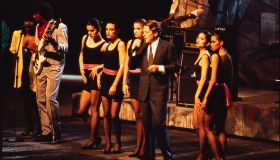ROCK MOMENT – Robert Palmer ‘I Didn’t Mean To Turn You On’

Robert Palmer’s “I Didn’t Mean to Turn You On’ stands as one of the sleekest, most irresistible tracks of the 1980s—a song that perfectly captured his mix of style, sophistication, and musical daring. While many fans associate it with Palmer’s smooth vocals and the iconic, fashion-forward video, the song’s story actually began a few years earlier. Originally written and produced by Jimmy Jam and Terry Lewis for Cherrelle in 1984, the tune was an R&B hit that showcased the Minneapolis duo’s signature blend of funk, pop, and electronic groove.
Palmer, known for his eclectic taste and ability to reinvent songs across genres, recorded his version for his 1985 album Riptide. Produced by Bernard Edwards of Chic, Palmer’s take transformed the soulful original into a sharp, synth-driven rocker that perfectly fit the polished, high-gloss aesthetic of mid-’80s pop. Released as the follow-up to his smash hit ‘Addicted to Love,‘ the single climbed to No. 2 on the Billboard Hot 100 in 1986, solidifying Palmer’s reputation as a master of crossover appeal.
The music video, directed by Terence Donovan, mirrored the stylized look of ‘Addicted to Love‘ with Palmer performing in a tailored suit, flanked by mannequin-like female musicians. The visual became one of MTV’s most defining images, cementing Palmer’s image as the epitome of ‘80s cool—elegant, confident, and utterly in control.
Over the years, ‘I Didn’t Mean to Turn You On‘ has continued to influence artists and pop culture. Mariah Carey covered it for her 2001 film and soundtrack Glitter, honoring both Palmer’s and Cherrelle’s earlier versions. The song has appeared in films, TV shows, and commercials, often used to evoke the glamorous, neon-lit energy of the 1980s. Modern artists like The Weeknd and Bruno Mars have cited Palmer’s sleek style and genre-blending approach as key influences on their own music.
Within Riptide, ‘I Didn’t Mean to Turn You On‘ fit seamlessly among tracks like ‘Discipline of Love‘ and the title track ‘Riptide.‘The album’s fusion of rock guitars, funk rhythms, and electronic textures reflected both Palmer’s versatility and Bernard Edwards’ production brilliance. Riptide went on to achieve multi-platinum success, earning widespread critical acclaim and securing Palmer’s place among the most distinctive voices of the decade.
The Riptide sessions also featured a powerhouse lineup of musicians who helped shape its crisp, confident sound. Bernard Edwards played bass and produced, while Tony Thompson, also of Chic, provided the thunderous drum work that powered both ‘Addicted to Love‘ and ‘I Didn’t Mean to Turn You On.‘ Guitarists Andy Taylor of Duran Duran and Eddie Martinez added rock grit and texture, while keyboardists Jeff Bova and Wally Badarou layered shimmering synth tones that defined the album’s futuristic feel. Together, they created a sound that was both modern and timeless—a perfect balance of rock precision and funk sophistication.
With Riptide, Robert Palmer didn’t just score chart-topping hits; he crafted a definitive statement of 1980s style and sound. ‘I Didn’t Mean to Turn You On‘ remains one of his crowning achievements—a timeless example of how Palmer could take a great song, reinvent it completely, and make it undeniably his own.





